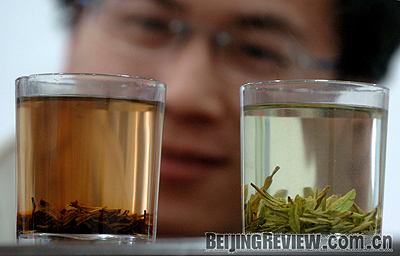|
|

TEA CONNOISSEUR? The Smartongue can be used to assess the quality of Longjing Tea, a famous Chinese tea produced in Hangzhou, Zhejiang Province (WANG DINGXU) | People usually pour wine into a colorless glass to observe the tint. Genuine wine usually looks clear, while fake ones, often with the residuals of unfermented sugar or remains of unwanted ingredients, tend to be less clear.
Aroma is another standard by which to judge alcoholic drinks. For instance, Wuliangye, a famous Chinese liquor brewed from five grains, including sorghum, corn, glutinous rice and wheat, is famous for its aroma, while fake versions often have a strong smell.
Taste is critical in judging the quality of alcoholic beverages. The tip of the tongue is especially sensitive to minute differences in flavor. The tongue can tell the level of alcohol, the age and the stage of development of a drink.
Now an intelligent analytical instrument called Smartongue can perform the job of a connoisseur. The Smartongue is the first commercialized electric tasting tongue for use at home in China.
The product was displayed at the Exhibition of the 14th World Congress of Food Science and Technology held in Shanghai from October 19 to 23. The expo, the Olympics of the global food industry, is held once every two years. This was its first time in China. The expo in Shanghai was co-hosted by the International Union of Food Science and Technology (IUFST) and the Chinese Institute of Food Science and Technology?CIFST). It attracted over 2,000 scholars and business people from more than 60 countries and regions.
The new generation of electric tongue born in China has attracted lots of attention. It consists of a cross-sensitive sensor array, a signal-collecting circuit and a pattern recognition-based data processing method.
The sensor array resembles the tongue, but can taste things that living creatures would not dare to, such as poisonous liquid.
The self-learning, signal-collecting circuit simulates the memory of the human mind, remembering the flavor of what it tastes.
The pattern recognition-based data processing method is an intelligent analytical system. It processes the information gathered with computer software and differentiates various chemical substances. It reports the information it has analyzed, usually by producing detailed graphs visualizing the flavors. The system not only produces data describing the nature of the substances tasted, but also reports the minute differences between the flavors of the substances.
The Smartongue was born in the sensory science laboratory of Zhejiang Gongshang University. Its father is Deng Shaoping, Vice Dean of the School of Food Sensory Science. Many years ago, he was a famous connoisseur and expert on alcoholic drinks. He worked for nearly two decades in the industry as chief engineer and the head of a factory.
He left the industry for the university with a dream of developing the electric tongue and after 15 years of research, the product finally was born.
At present, food safety is the focus of the public. "So far, Smartongue has been applied with great advantages in many aspects including discriminating between genuine and fake foods such as wine, distilled spirits, beverages and teas; quality control and shelf life of branded products; fast detection of pesticide residues; and fast detection of pathogenic microorganisms," Deng told Beijing Review.
He added that as a novel detection technique, Smartongue serves not only as a regular instrument for research work carried out in various research departments, but more importantly as an intelligent instrument for monitoring the real-time quality of products on the spot.
Now, Deng chairs China's first and only special food sensory laboratory, which he founded years ago. The key research areas of the lab are food sensory experimental psychology, food preference and the plasticity of the gustatory system, the sense of taste on the level of cells, taste bionics (electronic tongue) and food sensory quality.
Researchers in the laboratory study the theories of sensory mechanisms and cognitive processes, and apply these theories to sensory evaluation, testing, development of production techniques and the analysis of consumer preference. Their research addresses the issues of food quality and safety.
| 